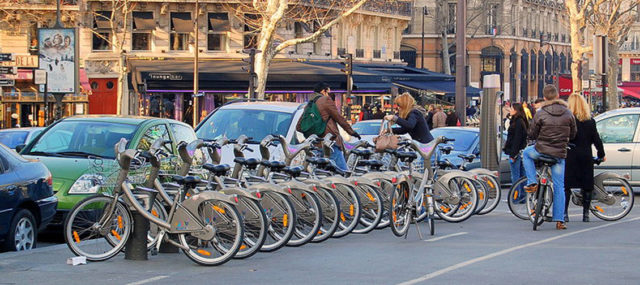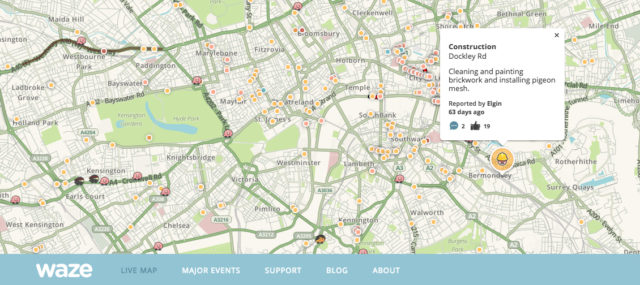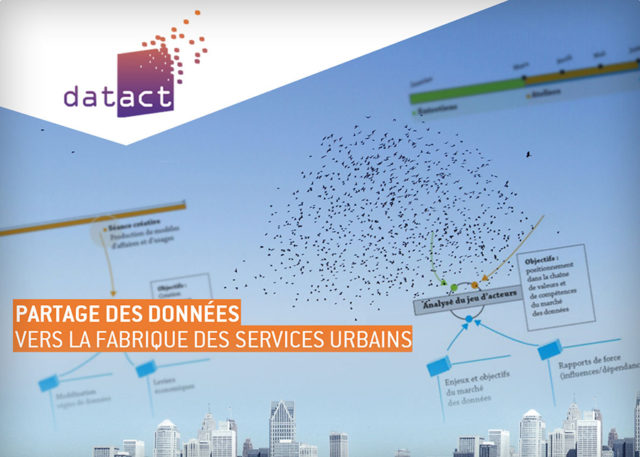
Why the Commons is the Way to Shake Up Transport of Tomorrow
septembre 23, 2015 — Uncategorized
When it comes to building better transport of tomorrow, we need to be mistrustful of short-term fixes. Today what we need are truly radical innovations, and I believe these will be found in the sharing economy – or more specifically in the commons.

It is astonishing to witness how many large companies still operate in the mindset inherited from the twentieth century. Take the autonomous vehicle, which does not in itself offer a solution to the problem of congestion, pollution or urban sprawl. At its best, it could help reduce road accidents. However, if the autonomous car gave rise to the “public car”, then it could help win the battle of transport of tomorrow.
There is also the example of Waze, which I referred to in a previous blog post. On the surface, Waze displays all the characteristics of smart mobility: it harnesses data, provides predictions based on algorithms, and connects with social media. However, for me, Waze is the same as adding a new lane to an urban motorway. It will create fluidity but will not change the number of cars. It is certainly a great business idea and useful to some drivers by helping them find alternative routes and save time. However for society the benefit is zero, as it will not help reduce the congestion of the city.

I believe that the springboard for a new mobility future can be found in the commons. By commons, I mean an open way of governing data, the sharing of knowledge and also a sharing of innovations when it comes to API. This is what Tesla is doing today – it is opening its API so that we can move forward collectively. The question we now face is just how far we can go with this notion of commons, with respect to mobility.
To begin with, however, we need to understand how we reached the current mobility crisis. In France for example, in the first half of the nineteenth century, the national railway network reached even the villages, and when there were no trains there were inter-urban trams, and roads with many coaches. This was an era of true public service. However, the proliferation of the car in the second half of the twentieth century progressively killed this public service, replacing it with “personal mobility”. Today, we have reached the limits of this system, with congestion, pollution, and a whole series of obstacles that constrain innovation.
Paradoxically, it is this crisis that has given rise to a progressive evolution, via startups, towards the sharing model. First of all came Zipcar in the United States, then bike sharing and all forms of car sharing right up to Google Maps, Uber, BlaBlaCar and other innovations. That is to say, we have moved progressively from the Fordist, fixed and rigid structure of daily life to something increasingly fluid, where citizens have far more choices.
This brings us right back to the origins of Chronos, the Paris-based think tank that I have led for the past 15 years. We founded Chronos upon the triangular relationship between space, time and digital technologies – which were just emerging at that point – that fundamentally define the urban space and the way we move around it. Early on, we were called upon by the RATP, the Paris transport authority, who said, “You are conducting research on the notion of time – could this not be applied to new ways of tackling mobility systems?” From then on, we began to look at how we could move away from a model dominated by public authorities and transport providers, to one focusing on the strategy of users, and the “agility” of the demand.
At the end of 2013, we published a study, “Mobilités émergentes” (Emerging Mobilities) on the promises of the sharing model. We are now radicalizing our approach by favoring the term “commons”. We realized that all too often, the profits of so-called “sharing” innovations are pocketed by private enterprises. This needs to change. The data that determines the success of these innovations should be given back to the public who feed them. In this light, the Mayor of Portland, Oregon, has set a positive example by obliging companies such as AirBnB and Uber to gather taxes and data on hosts for the benefit of the municipality. It is this model that will guide the development of better urban mobility. It provides a model for a new kind of public service and a shift of sovereign power. This is a crucial area that Groupe Chronos is exploring, alongside multiple partners. Take our Datact project, for example, or la Fabrique des Mobilités, a project that aims to produce an ecosystem of mobility innovations that are shared on the commons. Groupe Chronos was involved in its conception under the leadership of Gabriel Plassat.

Ultimately, we will only achieve groundbreaking mobility solutions by making wider societal changes. For example, as I have previously argued, changes to the worlds of work or healthcare will have a far greater impact on our mobility future than billions of dollars invested in transport infrastructure. The role of housing is also crucial. What if we integrated mobility solutions into the very fabric of housing developments? Many real estate companies and architects are already making headway in this realm. At Chronos, we recently presented, alongside Bouygues Construction, an idea for an office building that integrates an alternative mobility station – with options for car sharing, car pooling, bike sharing and other options – whilst also sharing and aggregating local transport data and applications to boost efficiency. Furthermore, we conceived the project for “Reinventing Paris”, the open call for innovative projects led by the City of Paris.
Today we have reached a tipping point, where the old Fordist values of individual transport are giving way to a new, exciting era of mobility-as-a-service. The commons provides the ideal framework for supporting this new way forward. The MaaS initiative of the City of Helsinki offers a promising example. This scheme rejects the notion of private cars, assembling a coherent, integrated, meta-platform for a multitude of mobility services.
At Chronos, we are currently working on a collaborative project, entitled CoMoN, which will set up a digital platform for sharing knowledge and fostering innovation around the movement of people and goods in France.
The future of mobility as I see it will be defined by three words: commons, commons, commons! And the more actors that recognize that now, the closer we are to achieving our goals for more sustainable, livable cities.
Based upon an interview conducted by Marina Bradbury, Director of Communications, NewCities